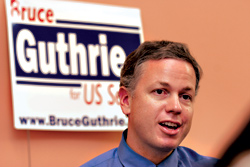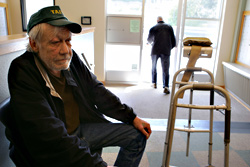IT’S NO SECRET that the Washington State Ferries are addicted to taxpayer subsidies the way some people are hooked on heroin. But the system’s sailing orders from the state Legislature are to straighten up and act more like a real business. That’s why ferry rates jumped 12.5 percent last week, part of a push to have user fees fund the fleet.
But now some think the push looks a little funny. Turns out, you see, that new ferry director/CEO Michael Thorne has a secret—a personal and growing addiction to public subsidies.
Thorne, along with his wife and son, owns a 5,000-acre wheat farm in eastern Oregon. Since 1996, the farm has received $682,000 in federal crop subsidies, according to U.S. Department of Agriculture data. That places him in the top 2 percent of welfare-receiving farmers nationally. The payments are expected to skyrocket under the federal $190 billion Farm Bill 2002—to as much as $193,000 a year, according to the Washington, D.C.-based Environmental Working Group.
That’s not likely to convince the public that Thorne, who came into his position last January touted as an entrepreneur, is fully capable of steering the ferry system through the storms of free market realities.
“Well, it doesn’t bolster confidence in his decisions,” says state Rep. Ruth Fisher, D-Tacoma, chair of the House transportation committee.
“Here’s the man charged with leading the ferry system into the future, and he’s tied to an old-fashioned crop program,” says Paul Guppy, vice president of research at the Washington Policy Center. “There’s a disconnect.”
Critics have long contended that farm subsidies too often end up in the bank accounts of large-scale, well-heeled farmers such as Thorne. And Thorne, 61, is certainly well-heeled: As head of the Washington State Ferries he makes $130,000 per year; he made $194,000 as executive director of the Port of Portland, making him the second-highest-paid public official in Oregon. He retired from that post in May 2001 to run for governor this year as a conservative Democrat. The move was stillborn. Soon after his campaign began, it became public that Thorne had engineered a questionable $50,000 pay increase for himself shortly before leaving the port; he later returned the money.
The revelation, however, was enough to spike his shot at the governor’s mansion. Still, Thorne, to his credit, had done some good work at the port, including reducing that agency’s dependence on public subsidies. That’s a big part of why he was hired to head the ferry system here.
He has his work cut out for him. By 2009, the system is slated to be 80 percent funded by passenger fares; currently, it approaches an estimated 70 percent. What’s more, for three years running, the state auditor’s office has reported that the agency has had sloppy cash controls at its ticket terminals. The implication is that it would be an easy task for an employee to siphon off cash.
Thorne did not answer repeated requests for comment. Patricia Patterson, a ferries spokesperson, says her boss believes his farm subsidies in Oregon are not related to his work as a public official in Washington.
Guppy calls the whole crop subsidy issue ironic and offers a suggestion.
“Maybe he could show leadership by weaning his farm off public subsidies,” he says. “That’d be impressive.”








